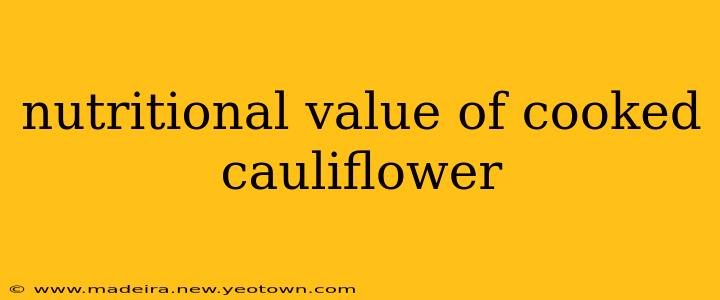Cauliflower, that often-overlooked member of the cruciferous vegetable family, is quietly making a name for itself as a nutritional superstar. While its creamy texture and mild flavor make it a versatile culinary chameleon, it's the impressive nutrient profile that truly sets cooked cauliflower apart. Let's delve into the fascinating world of this humble vegetable and uncover the secrets to its nutritional bounty.
What are the benefits of eating cooked cauliflower?
Cooking cauliflower, whether it's steaming, roasting, or even microwaving, doesn't diminish its nutritional value significantly. In fact, some cooking methods can even enhance the bioavailability of certain nutrients. The gentle heating process helps break down cell walls, making it easier for your body to absorb essential vitamins and minerals. Cooked cauliflower retains its impressive vitamin C content, offering a powerful antioxidant boost to your immune system. Furthermore, the cooking process can actually increase the levels of certain beneficial compounds, making it even healthier than its raw counterpart in some ways.
How many calories are in cooked cauliflower?
One cup of cooked cauliflower typically contains around 25-30 calories. This incredibly low calorie count, coupled with its high fiber content, makes cauliflower a fantastic addition to any weight-management plan. It promotes satiety, meaning you feel fuller for longer, naturally curbing your appetite and reducing overall calorie intake.
What nutrients are in cooked cauliflower?
Cooked cauliflower boasts an impressive array of vitamins and minerals. It's a significant source of:
- Vitamin C: A powerful antioxidant vital for immune function, collagen production, and iron absorption.
- Vitamin K: Essential for blood clotting and bone health.
- Folate (Vitamin B9): Crucial for cell growth and development, particularly important during pregnancy.
- Potassium: Plays a key role in maintaining healthy blood pressure.
- Fiber: Supports digestive health, regulates blood sugar levels, and contributes to feelings of fullness.
Beyond vitamins and minerals, cauliflower is also a rich source of various beneficial plant compounds, including glucosinolates, which have been linked to reduced cancer risk.
Is cooked cauliflower good for weight loss?
Absolutely! Its low calorie count, high fiber content, and overall nutrient density make cooked cauliflower an excellent choice for those looking to manage their weight. The fiber promotes satiety, reducing cravings and preventing overeating. Furthermore, the various vitamins and minerals contribute to overall metabolic health, supporting a healthy weight loss journey.
Does cooked cauliflower lose nutrients?
While some nutrient loss can occur during the cooking process, the majority of cauliflower's nutritional benefits are retained, particularly when using gentle cooking methods like steaming. Overcooking can lead to a decrease in water-soluble vitamins like vitamin C, but the overall impact on nutritional value remains relatively small. Choosing gentle cooking techniques helps maximize nutrient retention.
How to cook cauliflower to retain nutrients?
To maximize the nutritional value of your cauliflower, opt for gentle cooking methods. Steaming is an excellent choice as it preserves the vitamins and minerals effectively. Roasting cauliflower also retains many nutrients, and adds a delicious caramelized flavor. Avoid overcooking, which can lead to nutrient loss and a mushy texture.
Cauliflower's nutritional value extends far beyond its modest appearance. By understanding its nutritional profile and employing proper cooking techniques, you can unlock the full potential of this versatile and healthy vegetable, enriching your diet and promoting overall well-being. So, next time you're planning a meal, remember the hidden nutritional powerhouse waiting to be discovered in a humble head of cauliflower.

